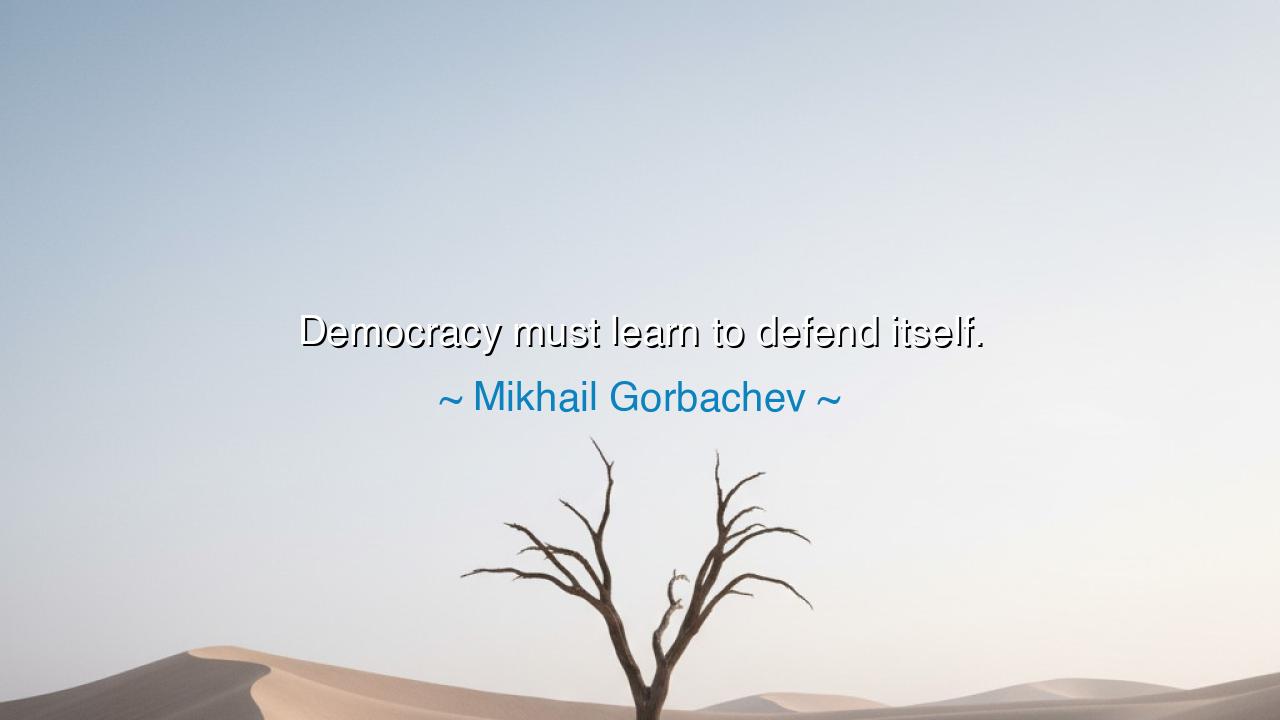
Democracy must learn to defend itself.






"Democracy must learn to defend itself." — Mikhail Gorbachev
Hear these words, O children of liberty, and feel their weight upon your conscience. Mikhail Gorbachev, the last leader of the Soviet Union and a man of both vision and tragedy, spoke them as one who had seen the peril of both tyranny and freedom. When he said, “Democracy must learn to defend itself,” he was not uttering a platitude, but a warning drawn from the ashes of empires. He had seen a world shackled by oppression and had tried, through courage and reform, to set it free — yet he learned that freedom, though noble, is fragile. For democracy, unlike despotism, depends upon the virtue and vigilance of its people. It cannot survive on faith alone. It must defend itself, not with swords and armies alone, but with truth, with courage, and with the unyielding will to resist decay from within.
The meaning of his words is both simple and profound. Democracy is not merely a system of government; it is a living covenant between the governed and the governing — a delicate balance of freedom and responsibility. Yet every freedom carries its shadow. Freedom invites corruption if it is not watched; it invites manipulation if it is not protected. Gorbachev saw that the enemies of democracy often arise not from outside, but from within — through apathy, greed, and deceit. He understood that democracy can die not in flames, but in silence — not by invasion, but by the slow surrender of its principles. Thus, he cried out across the ages: “Defend it, lest it perish!”
The origin of this wisdom lies in Gorbachev’s own struggle to reform a decaying system. As the leader of a vast and rigid empire, he sought to bring glasnost — openness — and perestroika — restructuring — to a nation long suffocated by lies. He believed that transparency, debate, and the rule of law could transform tyranny into democracy. But he learned, through bitter experience, that the birth of freedom is no gentle thing. The old powers fought to keep control; chaos spread where discipline had once ruled; and forces of nationalism and corruption rose from the ruins. Gorbachev’s dream of a peaceful, self-sustaining democracy faltered because the people, long oppressed, had not yet learned how to defend their newfound liberty. His words, then, are both confession and prophecy — the recognition that freedom without guardianship becomes its own undoing.
Consider, my friends, the lesson of Weimar Germany. After the First World War, Germany established one of the most liberal democracies of its time. It promised rights, representation, and the rule of law. Yet in its heart, the seeds of destruction were already sown. The people, battered by hardship and doubt, lost faith in freedom. They allowed anger to become their guide, and demagogues their saviors. Within a generation, democracy was consumed by tyranny, and liberty fell to the boot of the dictator. The Weimar Republic did not fall because it was weak in structure — it fell because it failed to defend itself from the poison of indifference and despair. Gorbachev’s warning echoes this history: when a people take their freedom for granted, they dig its grave with their own hands.
For democracy, unlike tyranny, does not defend itself by suppression but by truth. It cannot silence its enemies without losing its soul. Thus, its defense must be moral, not merely martial. It must be guarded by education, by participation, by the courage to speak even when speech is dangerous, and to act even when action is costly. The citizens of a free state must be its sentinels — questioning power, preserving honesty, and holding fast to justice even in the face of fear. The strength of democracy lies not in walls or weapons, but in the unbreakable spirit of those who refuse to surrender to ignorance and deceit.
But beware, O inheritors of liberty, for the greatest threat to democracy today is not open tyranny — it is apathy. It is the slow erosion of conviction, the numbing of conscience, the belief that freedom will guard itself. When citizens turn away from civic duty, when truth becomes a burden and lies become convenient, democracy sickens. Gorbachev saw this sickness spreading across nations — a world more connected than ever, yet more divided, more cynical, more easily deceived. To defend democracy in such an age requires not only laws, but the rekindling of moral courage — the willingness to care, to engage, to stand when others sit.
So let this be your lesson and your charge: be the defenders of democracy. Guard the truth as sacred fire, for falsehood is the thief of freedom. Speak when silence is safer. Vote when apathy tempts you not to. Question the powerful, but do not lose faith in the power of justice. Remember that democracy is not a gift — it is a trust, passed from the dead to the living, from the living to the unborn. It will endure only as long as you labor to keep it alive. For as Gorbachev declared, democracy must learn to defend itself — and if it forgets that lesson, it will vanish not in thunder, but in the quiet, sorrowful surrender of those who once believed that liberty would last forever.






AAdministratorAdministrator
Welcome, honored guests. Please leave a comment, we will respond soon